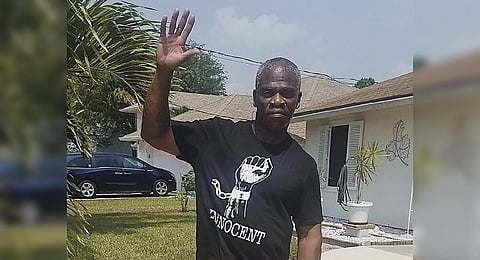

KINGSLAND: A Black man who spent more than 16 years imprisoned in Florida on a wrongful conviction was fatally shot Monday by a sheriff’s deputy in Georgia during a traffic stop, authorities said.
The Georgia Bureau of Investigation, which is reviewing the shooting, identified the man as Leonard Allen Cure, 53.
Cure had been represented in his exoneration case by the Innocence Project of Florida. The group’s executive director, Seth Miller, said he was devastated by news of the death, which he heard from Cure’s family.
“I can only imagine what it’s like to know your son is innocent and watch him be sentenced to life in prison, to be exonerated and ... then be told that once he’s been freed, he’s been shot dead,” Miller said.
The Georgia Bureau of Investigation said a Camden County deputy pulled over Cure as he drove along Interstate 95 near the Georgia-Florida line. He got out of the car at the deputy’s request and cooperated at first but became violent after he was told he was being arrested, a GBI news release said.
The agency said preliminary information shows the deputy shocked Cure with a stun gun when he failed to obey commands, and Cure began assaulting the deputy. The GBI said the deputy again tried using the stun gun and a baton to subdue him, then drew his gun and shot Cure when he continued to resist.
The agency didn’t say what prompted the deputy to pull over Cure’s vehicle.
It is customary for Georgia law enforcement agencies to ask the GBI to investigate shootings involving officers. The agency said it will submit its findings to the district attorney for the coastal Brunswick Judicial Circuit, which includes Camden County.
Miller couldn’t comment specifically on Cure but said he has represented dozens of people convicted of crimes who were later exonerated.
“Even when they’re free, they always struggled with the concern, the fear that they’ll be convicted and incarcerated again for something they didn’t do,” he said.
Cure was convicted of the 2003 armed robbery of a drug store in Florida’s Dania Beach. His conviction came from a second jury after the first one deadlocked. Cure was sentenced to life in prison because he had previous convictions for robbery and other crimes.
In 2020, the Broward State Attorney’s Office new Conviction Review Unit asked a judge to release Cure from prison. Broward’s conviction review team said it found “troubling” revelations that Cure had solid alibis that were previously disregarded and no physical evidence or solid witnesses to put him at the scene.
An independent review panel of five local lawyers concurred with the findings.
Cure was released that April after his sentenced was modified. In December 2020, a judge vacated his conviction and sentence.
“I’m looking forward to putting this situation behind me and moving on with my life,” Cure told the South Florida Sun Sentinel at the time.
In June, Florida Gov. Ron DeSantis signed a claims bill granting Cure $817,000 in compensation for his conviction and imprisonment, along with educational benefits.
Miller said Cure, who lived in a suburb of Atlanta, received the money in August.
Broward State Attorney Harold F. Pryor described Cure as smart, funny and kind.
“After he was freed and exonerated by our office, he visited prosecutors at our office and participated in training to help our staff do their jobs in the fairest and most thorough way possible," Pryor said in a statement to the Sun Sentinel.
Cure would frequently call to check in on Assistant State Attorney Arielle Demby Berger, the head of the Conviction Review Unit, and offer encouragement to continue to do “the important work of justice,” Pryor said.